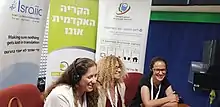Shira Yalon-Chamovitz
Shira Yalon-Chamovitz (born 8 November 1962, in Hebrew שירה ילון-חיימוביץ is an Israeli occupational therapist, Director of the Israel Institute on Cognitive Accessibility, and Dean of Students at Ono Academic College.[3][4] She has made significant contributions to the field of accessibility for people with cognitive disabilities, having coined the terms "cognitive ramps"[5] and "simultaneous simplification".[6][7]
Shira Yalon-Chamovitz[1] | |
|---|---|
| Born | November 8, 1962 |
| Citizenship | Israeli |
| Alma mater | University of Connecticut (1993-2000, PhD, Educational Psychology) Hebrew University of Jerusalem (1993, MSc, Occupational therapy) Hebrew University of Jerusalem (1986, B.Sc., Occupational therapy,) |
| Known for | Cognitive accessibility Simultaneous simplification |
| Spouse(s) | Daniel Chamovitz |
| Scientific career | |
| Fields | Cognitive accessibility Occupational therapy Universal Design in Learning |
| Thesis | Everyday wisdom in people with mental retardation: Role of experience and practical intelligence[2] |
| Doctoral advisor | Stephen Greenspan |
She is married to Daniel Chamovitz, an American-born plant geneticist and the 7th President of Ben-Gurion University of the Negev in Beer-Sheva, Israel.
Career
Cognitive accessibility covers accessibility considerations for people with cognition and learning disabilities.[8] Shira Yalon-Chamovitz published a theoretical model of practice, outlining considerations for cognitive accessibility.[9] This model has become the basis for subsequent models and implementation.[10][11]

Based on this model, Yalon-Chamovitz developed the "Simultaneous Simplification" technique,[12][13] which was first implemented globally during the Eurovision Song Contest 2019. The Israeli Public Broadcasting Corporation provided cognitive accessibility to the broadcast of the Eurovision through a digital video live stream, which involved translating what was said in real time in English into plain language Hebrew.[14]
She was a member of the committee that wrote the 2015 Israeli accessibility regulations which legally mandated in Israel the use of simple language and/or language simplification (Hebrew = פישוט לשוני).[15]
Most of Yalon-Chamovitz's research has concerned adults with cognitive disabilities.[16] During her doctoral research, she developed a video test of practical intelligence[17] which was included in the DSM-5 for the diagnosis of intellectual disability.[18] Subsequent research looked into the application of virtual reality for individuals with physical and intellectual diabilities,[19] and the use of co-teaching models in service learning in occupational therapy education.[20][21]
References
- "published CV". Retrieved 11 October 2019.
- "U Conn Doctoral Dissertations: Everyday wisdom in people with mental retardation: Role of experience and practical intelligence". Retrieved 11 October 2019.
- "Israel Institute on Cognitive Accessibility website". Retrieved 11 October 2019.
- "Shira Yalon-Chamovitz | PhD | Ono Academic College, Tel Aviv | ONO | Occupational Therapy". ResearchGate. Retrieved 2020-01-04.
- Yalon-Chamovitz, Shira; Shach, Ruth; Avidan-Ziv, Ornit; Tenne Rinde, Michal (18 February 2016). "The call for cognitive ramps". Work. 53 (2): 455–456. doi:10.3233/WOR-152244. PMID 26836027.
- Yalon-Chamovitz, Shira. "Simultaneous Simplification: Stretching the Boundaries of UDL". YouTube. 2016 UDL-IRN Summit.
- Yalon-Chamovitz, Shira; Steinberg, pnina; Shach, Ruth; Avidan-Ziv, Ornit (2019). "Simultaneous Language Simplification from the Perspective of People with IDD: Overcoming Cognitive Accessibility Barriers and Token Participation". SSRN Electronic Journal. doi:10.2139/ssrn.3390380.
- "Cognitive accessibility". MDN Web docs. Retrieved 12 October 2019.
- Yalon-Chamovitz, Shira (October 2009). "Invisible Access Needs of People With Intellectual Disabilities: A Conceptual Model of Practice". Intellectual and Developmental Disabilities. 47 (5): 395–400. doi:10.1352/1934-9556-47.5.395. PMID 19842744.
- Bracken, Seán; Novak, Katie (February 2019). Transforming higher education through universal design for learning : an international perspective. London: Routledge. p. 221. ISBN 9781351132077. Retrieved 12 October 2019.
- Bar-On, Amalia; Ravid, Dorit (April 2018). Handbook of communication disorders. De Gruyter. p. 845. ISBN 978-1-61451-490-9.
- Yalon-Chamovitz, Shira. "Simultaneous Simplification: Stretching the Boundaries of UDL". YouTube. 2016 UDL-IRN Summit.
- Yalon-Chamovitz, Shira; Avidan-Ziv, Ornit. "Simultaneous Simplification Stretching the Boundaries of UDL | Learning Designed". www.learningdesigned.org. UDL-IRN. Retrieved 12 October 2019.
- Spiro, Amy (12 May 2019). "A Eurovision broadcast accessible to all". Retrieved 11 October 2019.. The Jerusalem Post.
- Baron, Reuven; Yalon-Chamovitz, Shira; Noy, Nurit; Eilam, Gavriela; Eran, Orna. "Accessibility of the built environment: Communication (in Hebrew)" (PDF). The Standards Institution of Israel. Retrieved 15 October 2019.
- "Shira Yalon-Chamovitz - Google Scholar Citations". scholar.google.com.
- Yalon-Chamovitz, Shira; Greenspan, Stephen (May 2005). "Ability to identify, explain and solve problems in everyday tasks: preliminary validation of a direct video measure of practical intelligence". Research in Developmental Disabilities. 26 (3): 219–230. doi:10.1016/j.ridd.2004.08.002. PMID 15668073.
- Diagnostic and statistical manual of mental disorders : DSM-5 (5th ed.). American Psychiatric Association. 2013. ISBN 978-0-89042-554-1.
- Yalon-Chamovitz, Shira; Weiss, Patrice L. (Tamar) (May 2008). "Virtual reality as a leisure activity for young adults with physical and intellectual disabilities". Research in Developmental Disabilities. 29 (3): 273–287. doi:10.1016/j.ridd.2007.05.004. PMID 17590313.
- Yalon-Chamovitz, Shira; Kraiem, Yoav; Gutman, Carolyn (12 April 2017). "Deconstructing hierarchies: Service users as co-teachers in occupational therapy education". Work. 56 (3): 381–386. doi:10.3233/WOR-172502. PMID 28269798.
- Lahav, Orit; Daniely, Noa; Yalon-Chamovitz, Shira (2 June 2017). "Interpersonal social responsibility model of service learning: A longitudinal study". Scandinavian Journal of Occupational Therapy. 25 (1): 61–69. doi:10.1080/11038128.2017.1335775. PMID 28573894. S2CID 45345439.